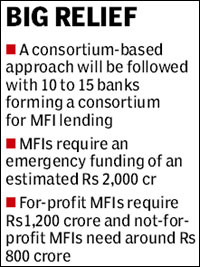Foreign direct investment (FDI) in multi-brand retailing is set to become a reality, with a 26% cap. Political consensus in this regard has been hammered out at the higher levels of the UPA establishment, people with direct knowledge of the matter confirmed to FE.
With influential wings of the government including the PMO, finance ministry, agriculture ministry and the Planning Commission lending support for the crucial piece of economic reform, political backing was bound to come. This has also been one of the most pressing demands made by the US Administration on India, which found mention during President Obama?s recent visit to the country.
FDI in retail could transform the way agriculture produce is procured, stored, conserved and marketed in the country. ?It is being hoped that the entry of FDI will be allowed by offering minority stakes to foreign firms, as in the case of Indian print media,? said a top government functionary.
Significant allies in the UPA like the Trinamool Congress and outside supporters BSP and SP had resisted FDI in retail trade, which was earlier proposed at 51%. However, even they are being pacified by the consensus formula of limiting the FDI in the sector initially at 26%.
?This (minority shareholding for foreign companies) is the way out which has been found,? the source said.
Kamal Nath in UPA-I and Anand Sharma in UPA II?both commerce ministers?have been keen on allowing FDI in retail.
Department of industrial policy and promotion (DIPP), the nodal agency for FDI policy-making, had recently put out a consultation paper suggesting opening up retail in phases. The paper found support in key wings of the government like the finance ministry and the department of consumer affairs. Once DIPP gets the nod of UPA chairperson Sonia Gandhi?which is expected soon, given the PMO gesture? it will move a Cabinet note in this regard, an official involved in the policy-making process said.
 Proposals to open up multi-brand retail were thwarted by Left Front allies during UPA-1, which expressed fears over the future of small family-run outlets. But UPA-II has shown the resolve to push bold reforms like freeing up fuel prices. FDI in retail is the next big reform agenda of the government.
Proposals to open up multi-brand retail were thwarted by Left Front allies during UPA-1, which expressed fears over the future of small family-run outlets. But UPA-II has shown the resolve to push bold reforms like freeing up fuel prices. FDI in retail is the next big reform agenda of the government.
In 2007, during his stint at the commerce ministry, Kamal Nath had proposed up to 51% FDI in select retail segments; however, the proposal stalled after protests from trade lobbies, Left parties and the opposition BJP and also due to Sonia Gandhi’s intervention. The UPA chairperson’s letter to the PMO advising caution against opening up the retail segment to foreign players had impeded all moves in this direction. The UPA chairperson had raised concerns on the feasibility of allowing retail in areas where small scale entrepreneurs and workers may get affected. However, with the recent developments, it is understood that Gandhi might agree to the consensus formula.
In its response to the DIPP consultation paper on the subject, the consumer affairs ministry had suggested that small retailers be encouraged to become franchisees of FDI-funded retail outlets. Small retailers should also be provided access to the logistics and supply chains set up by FDI-funded retailers, it stressed.
The consumer affairs ministry has said in a note to DIPP that FDI up to 49% in multi-brand retail is welcome but it should compulsorily be through infusion of fresh capital, 75% of which is spent on back-end infrastructure, supply chain, logistics and technology upgrade. The idea is to have a balanced policy that protects the interests of mom-and-pop stores.
US-based retailers like Wal-Mart and Germany’s Metro AG operate in the country through their cash-and-carry outlets which are open only for registered wholesale buyers.

